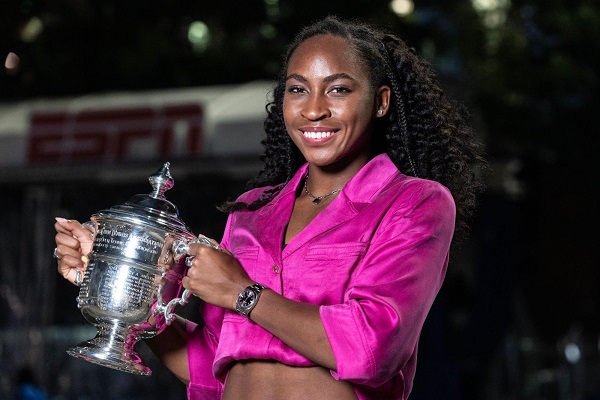Move over Serena and Venus — there is a new queen-in-waiting shaking up the tennis world and rewriting the rules of athlete entrepreneurship. Tennis fans are witnessing the rise of a new global icon — but this time, the story is as much about boardroom strategy as blistering forehands.
At just 21, Coco Gauff is not only cementing her place among tennis elites, but she is also making powerful business moves that position her as the sport’s next great mogul.
Coco-Mania is sweeping across the world, not just for her athletic talent, but for her business acumen, brand building, and cultural relevance.
While Gauff may still have some way to go to match the monumental legacies of the Williams sisters — Venus’ seven Grand Slam singles titles and Serena’s staggering 23 — the reigning French Open champion is crafting a powerful narrative of her own.
Already a two-time Grand Slam winner, Gauff is showing the world that she is just as focused on long-term legacy and financial empowerment as she is on mastering her backhand.
Next sports mogul?
Gauff's rise is meteoric. The reigning French Open champion earned €2.55 million for her Roland Garros triumph, though France’s steep tax regime slashed her prize to just over $1.6 million. But her earnings don’t stop there.
According to Forbes, Gauff banked a staggering $34.4 million last year, combining prize money and endorsement deals — the highest for any female athlete in the world.
That figure puts her a cool $10 million ahead of Polish rival Iga Świątek and nearly triple the income of Japanese star Naomi Osaka. Though still dwarfed by Cristiano Ronaldo’s $260 million, Gauff’s earnings speak to something even more impressive — her expanding influence beyond the tennis court.
Taking ownership of the future
Coco-Mania, as it is affectionately known among her fans, is morphing into a movement. The clearest sign that Gauff is building an empire came in April, when she unveiled Coco Gauff Enterprises, a new venture launched in collaboration with talent powerhouse WME.
The enterprise is designed to give her greater control over her brand, sponsorships and business dealings. The initiative reflects her growing desire to move beyond endorsement deals and into long-term equity partnerships.
“I’m learning more about how to be involved in the decisions, especially now that I’m older,” Gauff explained. “I want these partnerships to feel less transactional and more like investments in my future.”
The shift marks a turning point for Gauff, but it did not happen overnight. Early in her career, her father and manager, Corey Gauff, took the reins on her business affairs, shielding her from the potential pitfalls that have plagued many former stars.
But now, Gauff is stepping up front and centre in those conversations, shaping her brand, selecting partners, and negotiating terms. It’s a deliberate evolution — and one that many athletes never get right.
Fashion, footwear and the Gauff effect
One area where Gauff is redefining the game is fashion. At the recent Italian Open, she wore a striking kit designed in a trailblazing collaboration between New Balance and Miu Miu — the latter being Prada’s stylish sister brand.
The range, which includes footwear, clothing and accessories, is set to feature at three WTA events this season. Not since Serena Williams teamed up with Off-White has a tennis-fashion partnership caused this much stir.
When Gauff launched her signature sneaker — making her the first active female tennis star and only the second player ever, after Federer, to do so — it was clear she was here to stay.
Strategic partnerships
Gauff’s endorsements are not just about visibility; they’re carefully curated. She’s worked with Head (rackets), Rolex (watches), Naked Juice, Fanatics and Carol’s Daughter, among others. But her strategy is shifting from traditional endorsements to equity and long-term brand alignment.
Her strategic focus is on securing equity in companies she partners, ensuring she maintains control and wealth long after her playing days are over.
It’s a lesson well learned from the likes of Michael Jordan and Roger Federer — athletepreneurs who turned their sporting glory into billion-dollar ventures. With Coco Gauff Enterprises in place, that direction now has structure, vision and longevity.
From business structuring to fashion partnerships and equity-driven deals, Gauff is moving with intent. She is not waiting until the end of her playing days to begin her business journey. She is building her legacy now.
Key business lessons from Gauff’s playbook
1. Own narrative: Like Gauff creating her own enterprise, business leaders should take control of their brand and strategic direction rather than leaving it to external forces.
2. Think long-term: Don’t chase only short-term profits — equity and sustainable partnerships matter more. Gauff’s focus on equity deals is a masterclass in building future wealth.
3. Passion with profit: Gauff’s love for fashion led to a pioneering partnership with Miu Miu and New Balance. Aligning personal interests with business ventures can unlock new markets.
4. Build early and wisely: Early mentoring and smart decision-making, like her father shielding her from rookie mistakes, reinforce the importance of grooming talent and protecting brand equity from day one.
5. Adapt and evolve: Gauff’s seamless transition from teenage phenom to enterprise builder underscores the value of agility in business — evolving your model as the game changes.
